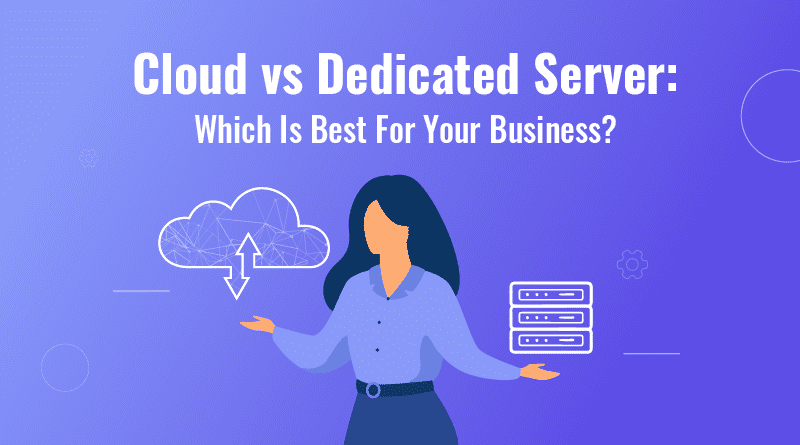Introduction
Cloud Server vs. Dedicated Server are two of the most popular types of web hosting available. Both have their own advantages and disadvantages, so it’s important to understand the difference between the two before making a decision about which one is right for you.Both offer distinct advantages and are tailored to different requirements, making it crucial for businesses to understand their differences. In this comprehensive guide, we will delve into the key aspects differentiating Cloud Server vs. Dedicated Server, presenting a 5-point comparison to assist in making informed hosting decisions.
What is a cloud server?
A cloud server is a virtual server that is hosted on a cloud computing platform. Cloud servers are typically more scalable and flexible than dedicated servers, and they can be provisioned and deployed much more quickly. Cloud servers are also often more affordable than dedicated servers, especially for small businesses and startups.
What is a dedicated server?
A dedicated server is a physical server that is dedicated to a single user or organization. Dedicated servers offer more control and customization options than cloud servers, and they are often more powerful than cloud servers. Dedicated servers are also a good choice for businesses that need to comply with specific security or data protection requirements.


Key differences between cloud servers and dedicated servers
The following table provides a high-level comparison of cloud servers and dedicated servers:
| Feature | Cloud server | Dedicated server |
|---|---|---|
| Scalability | More scalable | Less scalable |
| Flexibility | More flexible | Less flexible |
| Deployment time | Faster deployment time | Slower deployment time |
| Cost | More affordable | Less affordable |
| Control | Less control | More control |
| Customization | Less customization options | More customization options |
| Performance | Less powerful | More powerful |
| Security | Less secure | More secure |
Top 5 key points to consider when choosing between a cloud server and a dedicated server
When choosing between a cloud server and a dedicated server, it’s important to consider the following five key points:
1.Architecture and Infrastructure:
Cloud Server:
Cloud servers are virtualized servers that run on a cloud computing environment. They utilize a network of physical servers and virtual machines, allowing for dynamic resource allocation based on demand. This flexibility is made possible through virtualization technologies like hypervisors.
Dedicated Server:
Dedicated servers are physical servers exclusively dedicated to a single user or organization. Each server has its own set of hardware, including CPU, RAM, storage, and network connectivity. Users have complete control over the server’s configuration and resources.
2.Scalability:
Cloud Server:
Cloud servers offer exceptional scalability. Resources can be easily scaled up or down, allowing businesses to adapt to varying levels of traffic and demand. This scalability is often referred to as vertical scalability.
Dedicated Server:
Scalability in dedicated servers is limited to the hardware specifications of the physical machine. To scale resources, users may need to upgrade the server’s hardware, which can be time-consuming and may cause downtime.
3.Performance:
Cloud Server:
Cloud servers can deliver excellent performance, especially with advancements in cloud technology. However, the performance can be affected by the activities of other users on the same physical hardware (noisy neighbor effect).
Dedicated Server:
Dedicated servers offer consistent and high performance since all resources are dedicated to a single user or organization. The absence of resource sharing ensures predictable performance levels.
4.Cost Considerations:
Cloud Server:
Cloud servers typically operate on a pay-as-you-go or subscription-based model. While this can be cost-effective for small to medium-sized businesses, long-term usage might accumulate higher costs compared to dedicated servers.
Dedicated Server:
Dedicated servers usually involve a fixed monthly or annual fee. While the initial cost might be higher than cloud servers, the predictability and stability of pricing can make it cost-effective for businesses with consistent resource needs.
5.Security and Control:
Cloud Server:
Cloud servers offer robust security measures, but concerns about data privacy and security breaches may arise due to the shared infrastructure. However, reputable cloud service providers implement advanced security protocols to mitigate risks.
Dedicated Server:
Dedicated servers provide a high level of security and control. Users have complete administrative access, allowing them to implement specific security measures and configurations based on their requirements.
Which type of server is right for you?
The best type of server for you will depend on your specific needs and requirements. If you need a hosting solution that is scalable, flexible, and affordable, a cloud server is a good option. If you need a hosting solution that gives you complete control and customization options, a dedicated server is a good option.
Here are some additional factors to consider when choosing between a cloud server and a dedicated server:
- Your website traffic: If you have a high-traffic website, you may need a dedicated server to handle the load. Cloud servers can also handle high traffic, but you may need to scale up your resources to accommodate the demand.
- Your security needs: If you need a highly secure hosting solution, a dedicated server is a good option. Dedicated servers offer more security and control than cloud servers. However, cloud servers can still be a good option for most businesses, especially if they choose a reputable provider.
- Your budget: Cloud servers are typically more affordable than dedicated servers. However, the cost of a cloud server can vary depending on the resources you need and the provider you choose. Dedicated servers are more expensive than cloud servers, but they offer more control and performance.
Conclusion
In summary, the choice between a cloud server and a dedicated server hinges on various factors including the level of control needed, scalability requirements, budget considerations, and performance expectations. For businesses prioritizing flexibility, scalability, and cost-efficiency, cloud servers are often the preferred choice. Conversely, those seeking unparalleled performance, security, and complete control opt for dedicated servers.Cloud Server vs. Dedicated Server
Understanding the nuances and features of each hosting option is essential in making an informed decision that aligns with your organization’s goals and requirements. Whether it’s the dynamic and scalable nature of cloud servers or the stability and performance of dedicated servers, both hosting solutions have their unique advantages, and choosing the right one depends on your specific business needs.

